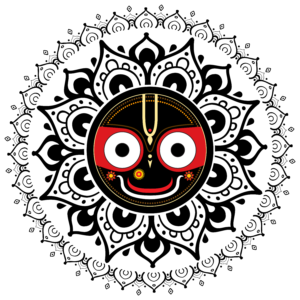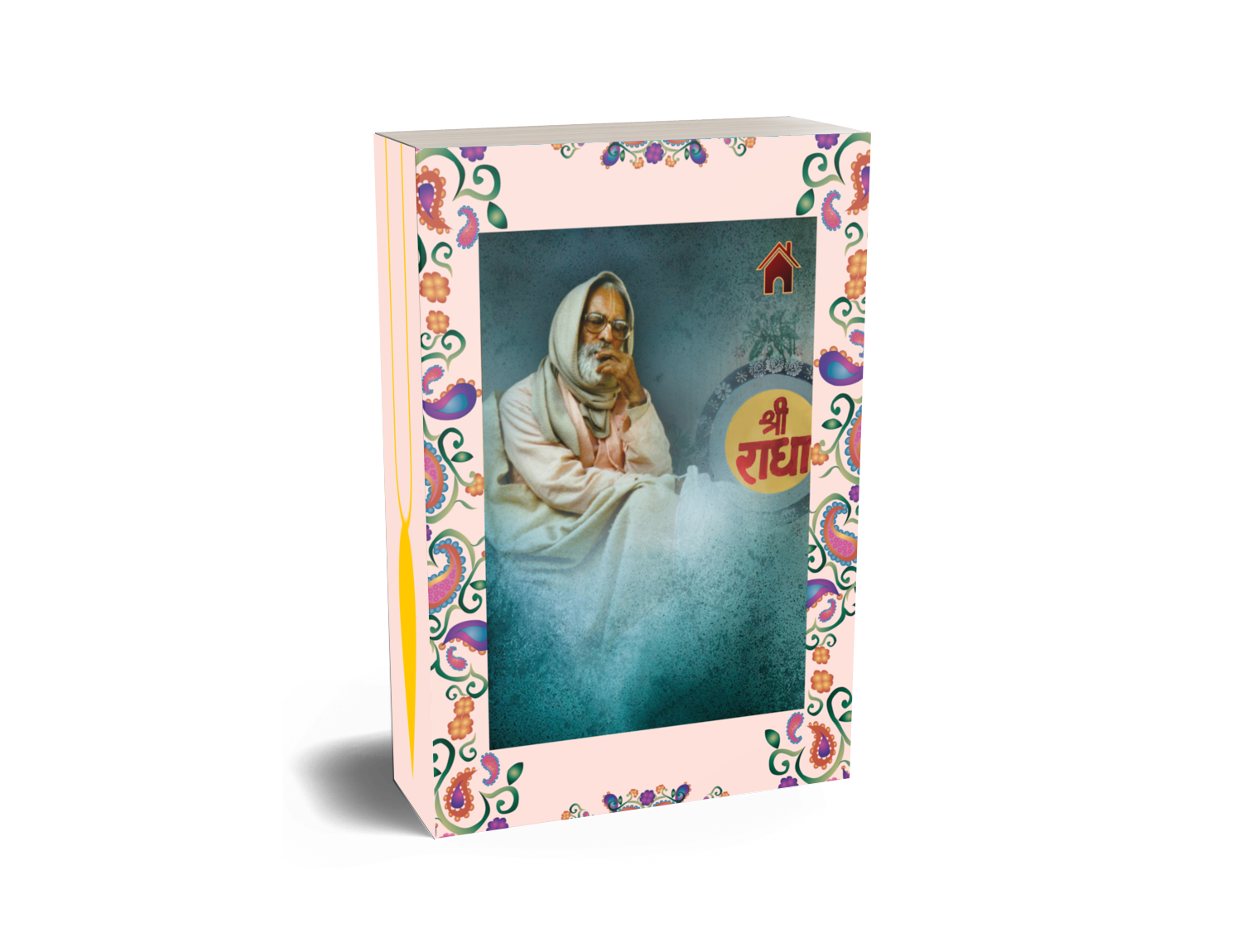

The following is an excerpt from The Origin of the Ratha-yātrā, Chapter 6 by Śrīla Bhaktivedānta Nārāyaṇa Mahārāja
Before Umā was married to Śaṅkara, Nārada came and revealed Śaṅkara’s glories to her. After that, Śaṅkara told someone, “Go and test that girl,” so his messenger went to Umā and told her, “Śiva is an unintelligent, bogus 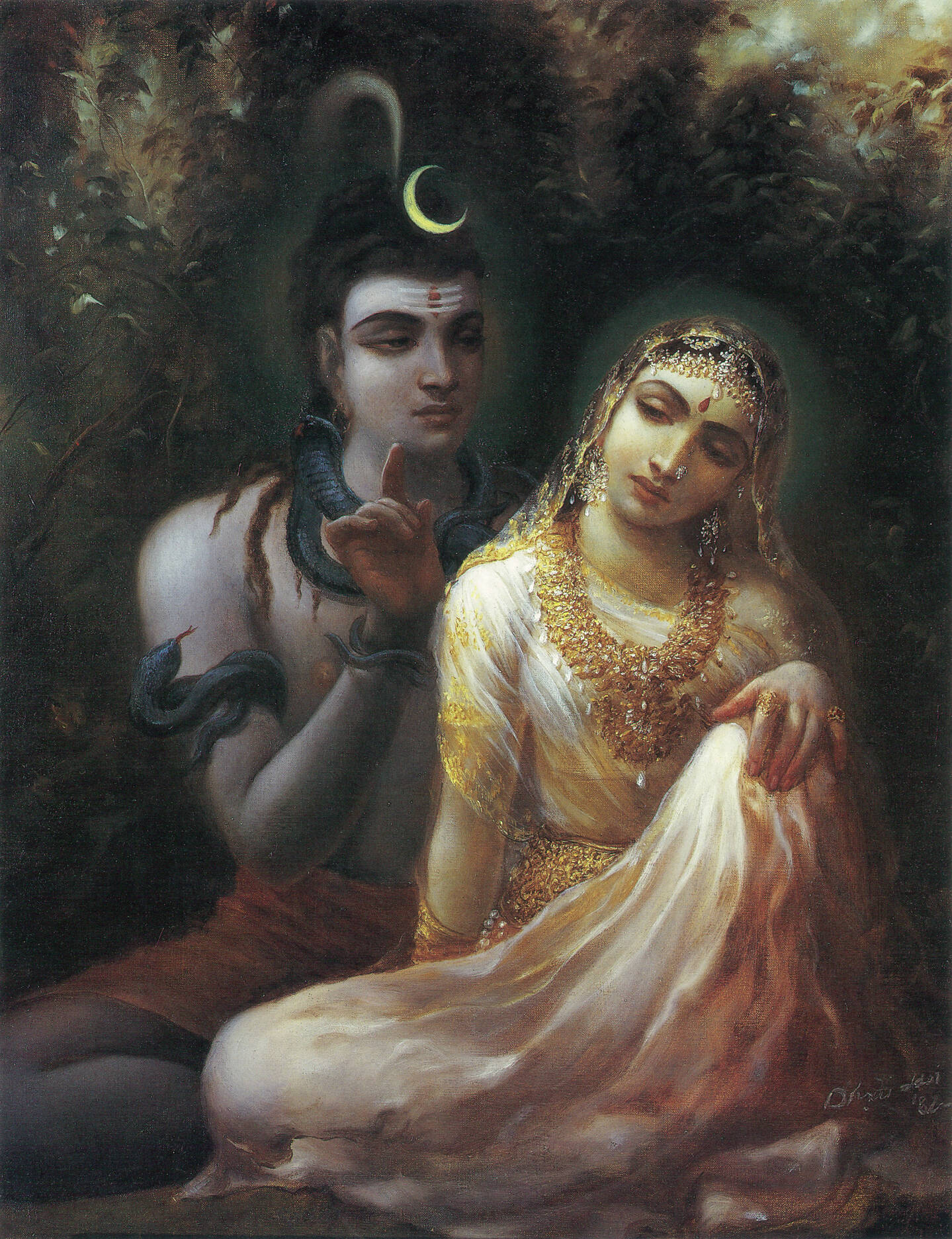 man. He is always naked, he wears garlands of skulls and ornaments of snakes, he smears dust from the ashes of corpses all over his body, he wears rudrākṣa beads, he always carries a trident, and he sits on a bull like a mad person. Why have you chosen him to be your husband?”
man. He is always naked, he wears garlands of skulls and ornaments of snakes, he smears dust from the ashes of corpses all over his body, he wears rudrākṣa beads, he always carries a trident, and he sits on a bull like a mad person. Why have you chosen him to be your husband?”
Her father also told her, “O my dear darling daughter, change your mood. I will marry you to an exalted personality like Viṣṇu, or someone else who is very beautiful. Why have you chosen Śaṅkara?”
Umā told her father, “It may be that Śaṅkara wanders naked, plays with ghosts and witches, ornaments himself with serpents, and sometimes swallows poison. But even if this is true, I will marry him and no one else. I have chosen him for all time, even though he does nothing. I don’t want to give him up. I will marry him.” So many other suitors came, and even Śaṅkara came in disguise to test her, but she did not change her mind.
For worldly persons, for all of you, the mind and heart are different, but these examples confirm that the hearts of elevated personalities never consider whether someone is beautiful or not, or what he has done or not done. The decision to love is “forever.” Anyera hṛdaya mana. For most people the mind always gives problems. Sometimes it accepts something, and at other times it rejects the same thing; this is called saṅkalpa-vikalpa. But “mora mana vṛndāvana – My mind is Vṛndāvana.” The mind and heart of the gopīs are one.

The following is an excerpt from Śrīla Bhaktivedānta Nārāyaṇa Mahārāja’s commentary on Śrī Dāmodarāṣṭakam, Verse 3
One day Mahādeva Śiva, the chief demigod, set off to see his supremely worshipful Lord who had just appeared 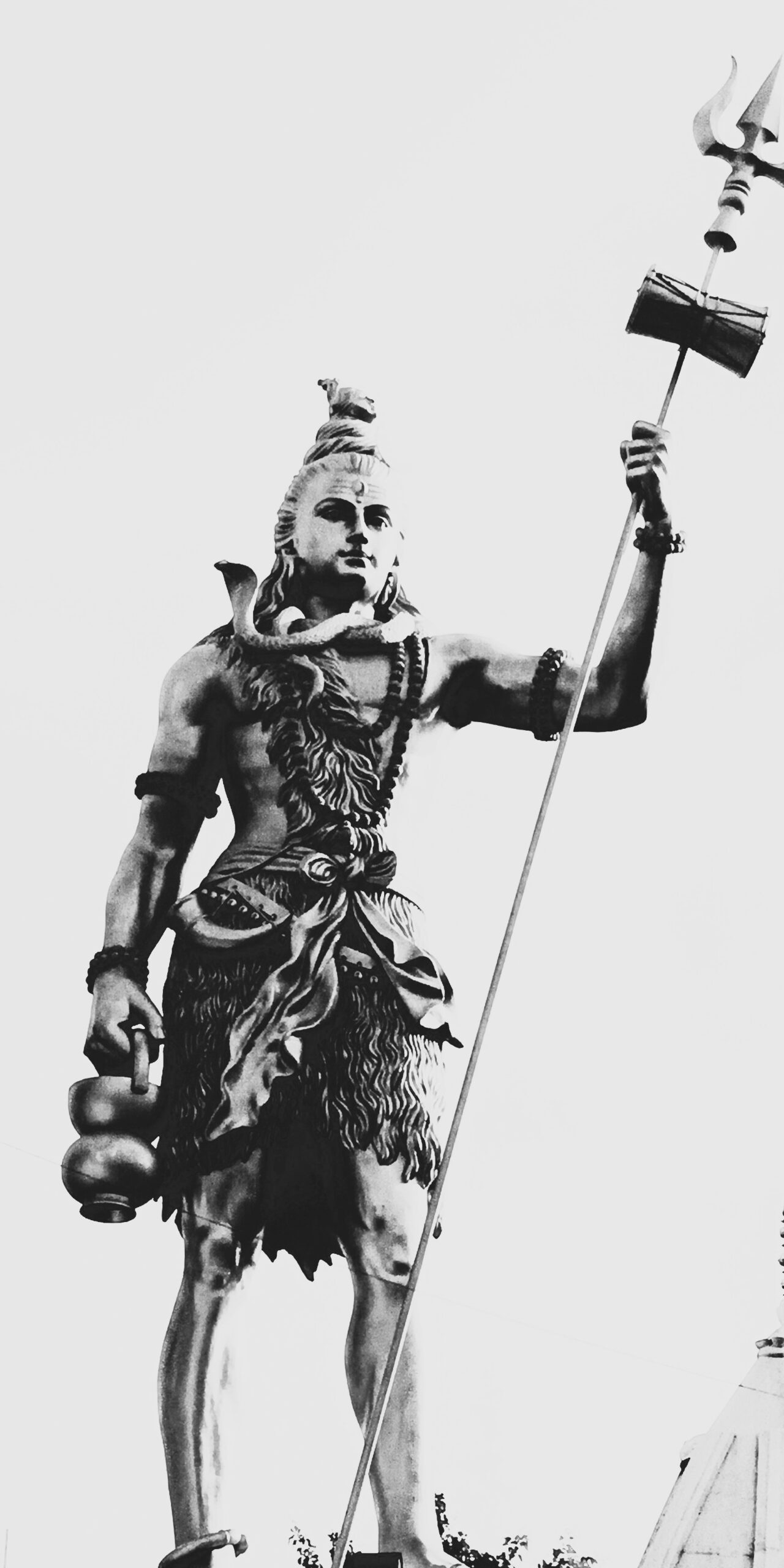 in Vraja. Arriving at the gate of Nanda Mahārāja’s home, he sang loudly, “Alakha nirañjana, alakha nirañjana!”* and played his ḍamarū (a kind of hand drum).
in Vraja. Arriving at the gate of Nanda Mahārāja’s home, he sang loudly, “Alakha nirañjana, alakha nirañjana!”* and played his ḍamarū (a kind of hand drum).
Mother Yaśodā came to the door when she heard him singing and playing his drum, but when she saw the appearance of this unusual yogī, she became afraid. He wore robes of tiger skin and a garland of human skulls. Dangerous serpents adorned his hands, feet and neck, and he held a tall, fearful trident by his side. His body was smeared from head to toe with ashes from a cremation ground and his thoroughly matted hair made him look ancient and even more dreadful. His carrier, Nandī, a massive bull, accompanied him. Seeing that the terrible-looking yogī was approaching her accompanied by Nandī, Yaśodā became utterly terrified. Nonetheless, she asked him dutifully, “Do you want some alms? Just wait and I will bring them to you.”
Mahādeva Śaṅkara replied, “O Mother, I have walked so far to come here from my home in Kailāśa. Just show me your baby; I just want to see your darling child.”
“Eat or drink whatever you like, and then go,” she said. “And do not play your ḍamarū so loudly. My child is sleeping.”
Śaṅkarajī said, “O innocent Mother, I do not want your flour and beans, or silk clothes and bags, nor do I want anything to eat, drink, wear or rest upon. I have come to see your darling son just once. This is the only donation I need.”
Mother Yaśodā hesitated and then said to him, “I am an adult, yet your appearance terrifies me. My darling boy is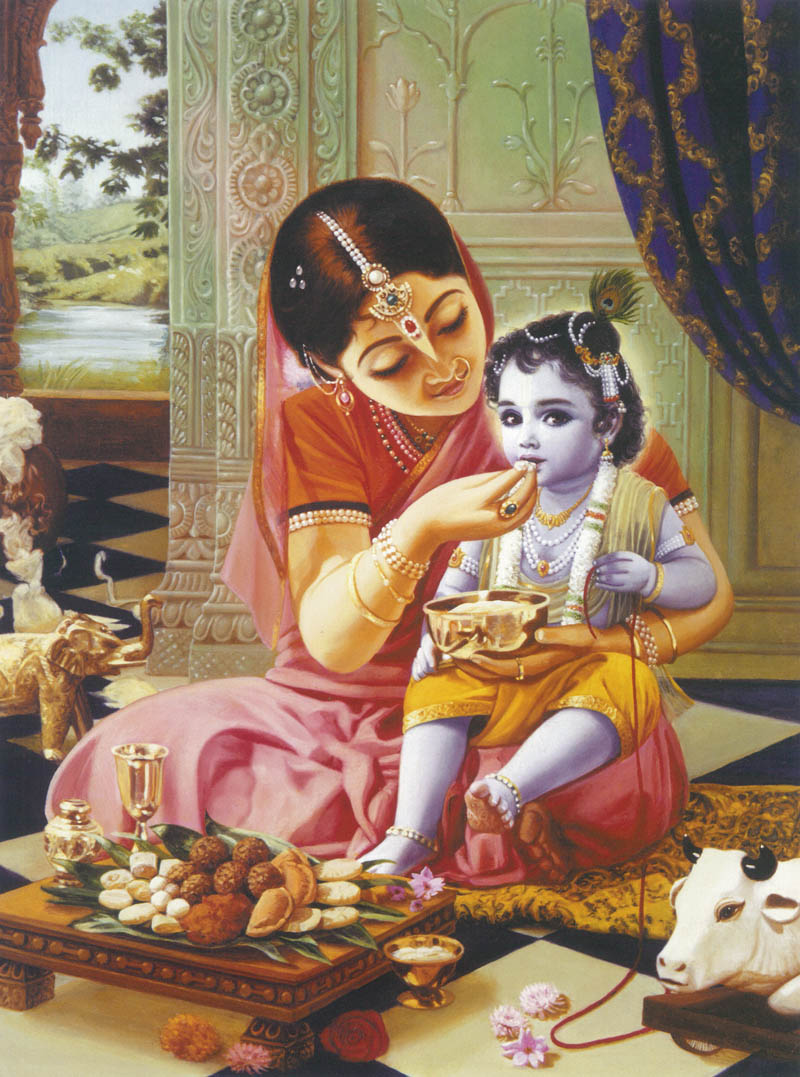 so young. He will become too afraid if He sees your form, so I will not show Him to you.” And she went inside the house.
so young. He will become too afraid if He sees your form, so I will not show Him to you.” And she went inside the house.
Śrī Śaṅkara, the foremost demigod, was not about to leave without seeing Śrī Kṛṣṇa. He sat down by the door and lit a ceremonial fire.
“When your beautiful son grows a little older,” he thought, “He will come outside to play and I will finally be able to see Him. I will not return to Kailāśa without seeing Him.”
To this day, the place near Nanda’s home where Mahādeva Śrī Śaṅkara was sitting is known as Yogiyā-kuṇḍa.**
Mother Yaśodā entered the house and found her darling baby boy crying loudly. Nothing she tried would pacify Him so she consulted her friends. A respected elder gopī spoke.
“This is not an ordinary yogī; he is from the sacred mountains of Kailāśa. When your boy heard him playing his drum, He became afraid and now He has started to cry more and more loudly. It would be wise to show him your dear son at least once.”
Seeing no other recourse but to show her son to the extra-ordinary yogī, Yaśodā-maiyā placed Kṛṣṇa in a black  basket and covered all of His limbs with black cloth to protect Him from inauspiciousness. She anointed His eyes with thick black eyeliner and marked His forehead with a black dot. Then she reluctantly brought Kṛṣṇa outside and allowed the yogī just a brief glimpse of Him. To her astonishment, when she was turning to enter her house, she noticed that Kṛṣṇa had stopped crying. Śrī Śaṅkara, the king of mystics, spoke to her.
basket and covered all of His limbs with black cloth to protect Him from inauspiciousness. She anointed His eyes with thick black eyeliner and marked His forehead with a black dot. Then she reluctantly brought Kṛṣṇa outside and allowed the yogī just a brief glimpse of Him. To her astonishment, when she was turning to enter her house, she noticed that Kṛṣṇa had stopped crying. Śrī Śaṅkara, the king of mystics, spoke to her.
“Mother, I will light a ceremonial fire and stay nearby. If ever your beloved child falls prey to some evil, just call for me. I will chant mantras and ward off any evil effects with mustard seeds and salt, and He will be restored to health.”
Thereafter, whenever Kṛṣṇa would cry she would call the yogī from his dwelling.
yogī! calo nanda-bhavana meṅ,
yaśomatī maiyā tumheṅ bulāve
vāke lāla ko najara lagī hai,
tai pai rāī nūn karavāveṅ
raha raha yogī! nanda-bhavana meṅ,
vraja meṅ vāsa sadā tū kījo
jaba jaba vāko lālā rove,
taba taba darasana dījo
Yogī, come to Nanda-bhavana; Kṛṣṇa’s devoted mother, Yaśodā Maiyā, is calling you. Her dear son has come under an evil eye. Ward off its effect with mustard and salt. Stay here, yogī, just stay here in Nanda-bhavana. Please live in Vraja forever. Whenever her darling son cries, come and give Him your darśana.
Thus, the life of that ‘yogī ’ became successful.
* Editor’s footnote: This phrase is used to beg alms in the name of Śrī Bhagavān or simply to make one remember Him. It is a description of Paramātmā, who is invisible (alakha) and aloof from māyā (nirañjana).
** An excerpt from the book Śrī Vraja-maṇḍala Parikramā, Second Edition
Jogiyā-sthala
This very charming place, surrounded by trees and creepers, lies north-east of Kṛṣṇa-kuṇḍa. Mahādeva Śaṅkara worships Kṛṣṇa here, and therefore this place is also known as Mahādeva’s sitting place (baiṭhaka). Once, Mahādeva Śaṅkara, desiring to have Kṛṣṇa’s darśana, was wandering throughout Vraja like a madman, but his repeated attempts bore no success. Sometimes, Kṛṣṇa would be sleeping when he arrived and sometimes He would be sucking the breast of His mother. Also, Mother Yaśodā did not want to show her baby Kṛṣṇa to this strange yogī, whose hair was matted, who was adorned with a necklace of serpents, and who was riding a bull and carrying a trident in his hand. She thought that he might give her son the “evil eye”.
Finally, a defeated Śaṅkara sat down at this very spot firm in his decision not to leave until his desire was fulfilled. He started to beg by invoking the name of God, loudly calling out, “Alakha nirañjana, alakha nirañjana!” and playing on his ḍamarū drum. Inside Nanda-bhavana baby Kṛṣṇa also started to bawl just as loudly as Śaṅkara was calling out and playing his drum. The drum playing did not stop, nor did Kṛṣṇa’s crying. Finally, the clever elderly gopīs advised Yaśodā, “This must be the work of that yogī. He certainly knows some mantras, so 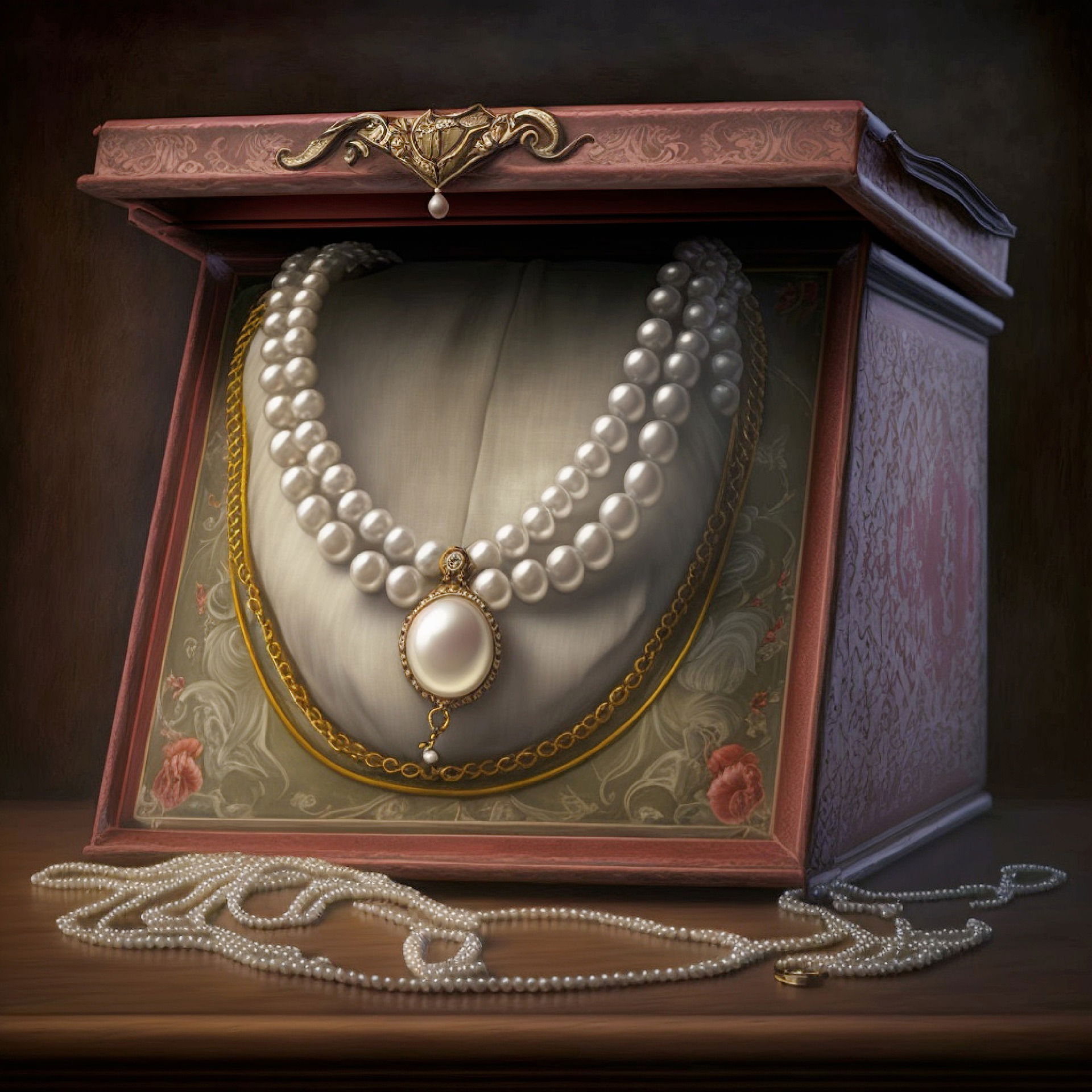 why not call him to pacify the child?” They went to the yogī and said, “O yogī, come, Nandarānī Yaśomatī is calling you to Nanda-bhavana.” Hearing this, Śaṅkarajī became so happy and made his way to Nanda-bhavana, where he took some mustard seeds and salt in his hands, touched the head of baby Kṛṣṇa and blessed Him. When touched by the hands of Śaṅkara, Nanda-lālā immediately stopped crying and began to make sounds of joy. Seeing the yogī’s wonderful act, Nandarānī (Yaśodā) became very pleased with him and gave him her pearl necklace in charity, saying, “Yogī, you should stay here at Nanda-bhavana and, whenever my lālā cries, you should pacify Him by your darśana.”
why not call him to pacify the child?” They went to the yogī and said, “O yogī, come, Nandarānī Yaśomatī is calling you to Nanda-bhavana.” Hearing this, Śaṅkarajī became so happy and made his way to Nanda-bhavana, where he took some mustard seeds and salt in his hands, touched the head of baby Kṛṣṇa and blessed Him. When touched by the hands of Śaṅkara, Nanda-lālā immediately stopped crying and began to make sounds of joy. Seeing the yogī’s wonderful act, Nandarānī (Yaśodā) became very pleased with him and gave him her pearl necklace in charity, saying, “Yogī, you should stay here at Nanda-bhavana and, whenever my lālā cries, you should pacify Him by your darśana.”
Sūradāsa has described this pastime in the following poem, which is steeped in transcendental emotion:
cal re jogī nandabhavan meiṅ yasumati tohi bulāve
laṭkat-laṭkat saṅkar āvai man meiṅ mod baḍhāve
nandabhavan meiṅ āyo jogī rāī non kar līno
bār pher lālāke ūpar hāth śīś par dīno
vithā bhaī ab dūr badan kī kilak uṭhe nandalālā
khuśī bhaī nandajū kī rānī dīnī motiyan mālā
rahure jogī nandabhavan meiṅ braj ko bāso kījai
jab-jab mero lālā rovai tab-tab darśan dījai
tum to jogī param manohar tum ko ved bakhāne
(śiv bole) būḍho bābā nām hamāro sūrśyām mohi jāneṅ

The following is an excerpt from Śrīla Sanātana Gosvāmī’s Śrī Bṛhad Bhāgavatāmṛtam Volume One, (Part One), Dig-darśinī-ṭīkā by Śrīla Bhaktivedānta Nārāyaṇa Mahārāja, Chapter 2, Text 81-83
For this reason, to mock such people attached to sense enjoyment, he wears the dhatūrā flower or poisonous thorn apple, and a garland of asthi, skull bones. To show his firm devotional faith in his heart, he assumes these external ornaments, and to show the wealth of Brahmā and Indra as fleeting, he adorns himself with these worthless decorations. Otherwise, it is impossible for the topmost controller to wear such decadent ornaments. In spite of being unable to hide his true nature, he holds Śrī Gaṅgā that emanates from the lotus feet of Śrī Kṛṣṇa upon his head, very happily dancing and making the entire universe tremble and shake.
 The following is an excerpt from a lecture by Śrīla Gaura Govinda Svāmī Mahārāja in Bhubaneswar, India on February 16 15, 1994, published in Kṛṣṇa Kathāmṛta No.7 published by Gopal Jiu Publications (Gopaljiu.org/archive)
The following is an excerpt from a lecture by Śrīla Gaura Govinda Svāmī Mahārāja in Bhubaneswar, India on February 16 15, 1994, published in Kṛṣṇa Kathāmṛta No.7 published by Gopal Jiu Publications (Gopaljiu.org/archive)
Therefore Vaiṣṇavas worship Śiva. The gopīs worship Śiva to get Kṛṣṇa as their husband. That is Gopīśvara 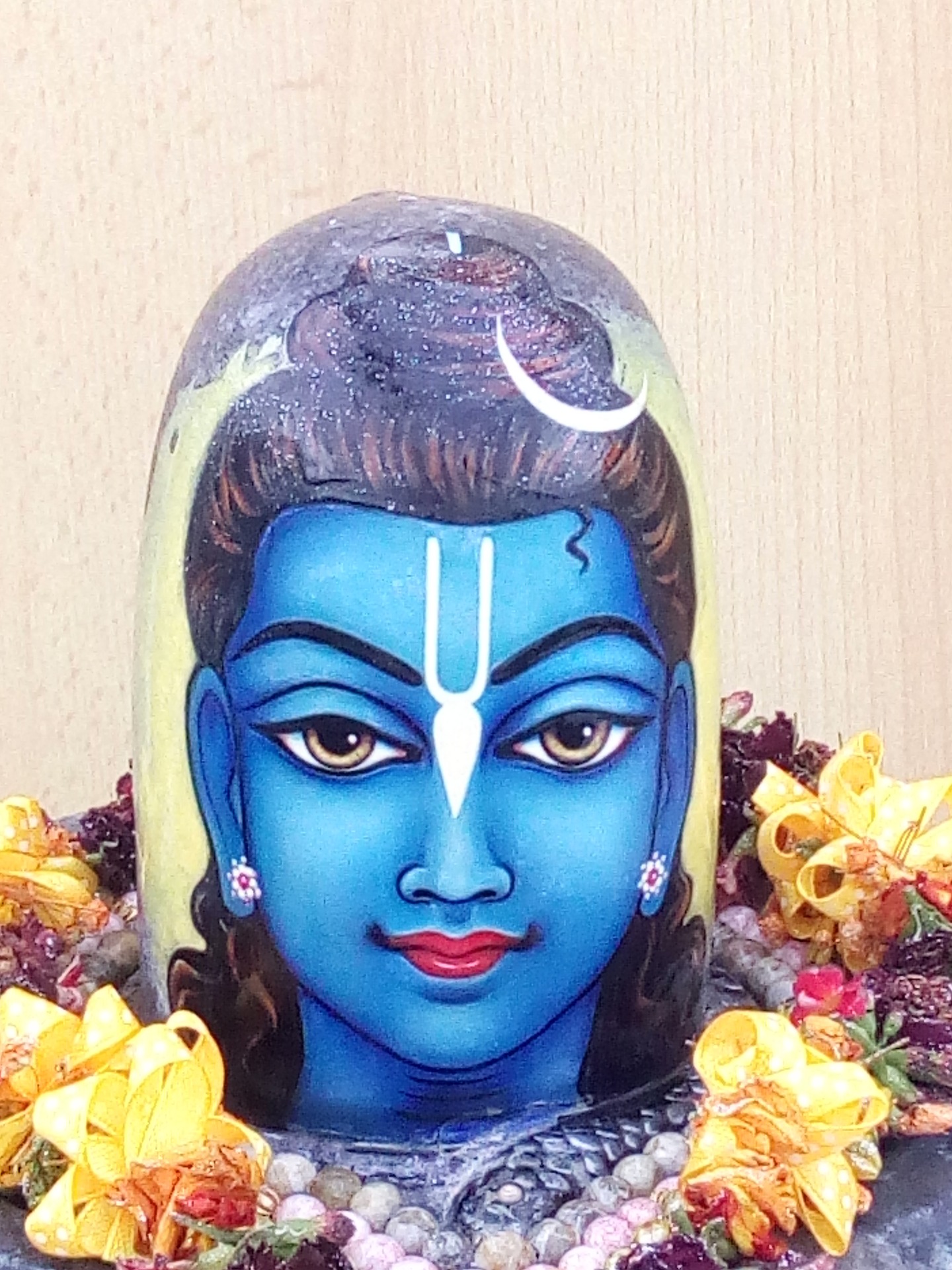 Mahādeva in Vṛndāvana. Similarly, Vaiṣṇavas offer worship to Śiva as a dear Vaiṣṇava, mahā-bhāgavata, and beg, “Give us bhakti.” They never ask for anything material. It is the demons that ask for material gains, material wealth, position, and strength.
Mahādeva in Vṛndāvana. Similarly, Vaiṣṇavas offer worship to Śiva as a dear Vaiṣṇava, mahā-bhāgavata, and beg, “Give us bhakti.” They never ask for anything material. It is the demons that ask for material gains, material wealth, position, and strength.
Śivajī has two types of mercy, sakapaṭa-kṛpā, and akapaṭa-kṛpā, mercy with duplicity, and mercy without duplicity. The demons get mercy with duplicity. In his purport, Śrīla Prabhupāda has given the example of the demon Rāvaṇa. He got mercy with duplicity. The demons want material things, so they get material wealth, power, strength, prestige, and position — everything they want. Śiva gives it, “All right, tathāstu! Take it! Take it!” But Śivajī never accepts it for himself. Śivajī’s form is naked. He has put on garlands of bones and snakes. His whole body is smeared with ashes. He lives in the cremation ground and dances naked like a madman. This means he kicks out all material assets, wealth, and enjoyment. But he gives it to demons, “All right, take it.” This is mercy with duplicity, sakapaṭa-kṛpā. But the Vaiṣṇavas, bhaktas, they get akapaṭa-kṛpā, mercy without duplicity. They get bhakti. Therefore the gopīs pray to Śiva, “Let Kṛṣṇa be our husband.” Śivajī has these two types of mercy.
 An excerpt from a morning walk with Śrīla Bhaktivedānta Nārāyaṇa Mahārāja in Paris, France, on June 29, 2009, published in Walking with a Saint – Morning Walks and Conversations 2009
An excerpt from a morning walk with Śrīla Bhaktivedānta Nārāyaṇa Mahārāja in Paris, France, on June 29, 2009, published in Walking with a Saint – Morning Walks and Conversations 2009
Bhakta-svarūpa dāsa: Gurudeva, can you explain why Lord Śiva has a half-moon on his head?
Śrīla Bhaktivedānta Nārāyaṇa Mahārāja: The half-moon is more beautiful than the full moon. Another reason is that Śiva is crooked**. He therefore wants everything connected with him to be crooked.
Bhakta-svarūpa dāsa: There is no siddhānta (conclusive philosophic truth) regarding that half-moon? It is only for beauty?
Śrīla Bhaktivedānta Nārāyaṇa Mahārāja: The moon is auspicious, especially during the tṛtīya (third) day of the waxing moon. This is the phase of the moon that is situated on the head of Śiva.
** Lord Śiva is crooked in the sense that his transcendental, out-of-the-ordinary activities are not possible for one to understand without Kṛṣṇa’s mercy. One side of him can be seen easily, while another is hidden. The moon also has two sides; one is seen and the other is hidden.

The following is an excerpt from Śrīmad-Bhāgavatam, Canto 3: The Status Quo by Śrīla Bhaktivedānta Svāmī Mahārāja Prabhupāda, Chapter Twenty-six, Verse Twenty-one, Purport
In order to get release from the false ego, one has to worship Saṅkarṣaṇa. Saṅkarṣaṇa is also worshipped through Lord Śiva; the snakes which cover the body of Lord Śiva are representations of Saṅkarṣaṇa, and Lord Śiva is always absorbed in meditation upon Saṅkarṣaṇa. One who is actually a worshiper of Lord Śiva as a devotee of Saṅkarṣaṇa can be released from false, material ego.

The following is an excerpt from the booklet Śiva-Tattva: Three Considerations by Śrīla Bhaktivedānta Nārāyaṇa Mahārāja
Consider further the identity of Lord Śiva’s worshipable Deity. Śiva’s mantra is Rāma, and he always chants the holy name of Rāma. To whom does this refer? Although this also refers to Śrī Sītā-Rāma, the name he actually chants is that of Mūla-Saṅkarṣaṇa, Balarāma, the first expansion of Lord Kṛṣṇa. Śrī Rāmacandra is also an expansion of the original Rāma – Balarāma – but the factual worshipable Deity of Lord Śiva is Balarāma.
 An excerpt from an airport darśana with Śrīla Bhaktivedānta Nārāyaṇa Mahārāja in Kuala Lumpur, Malaysia, on April 19, 2007, published in Walking with a Saint – Morning Walks and Conversations 2007
An excerpt from an airport darśana with Śrīla Bhaktivedānta Nārāyaṇa Mahārāja in Kuala Lumpur, Malaysia, on April 19, 2007, published in Walking with a Saint – Morning Walks and Conversations 2007
Kṛṣṇa-priyā dāsī: Śrīla Bhaktivinoda Ṭhākura says in Jaiva-dharma that we should only take prasādam that has 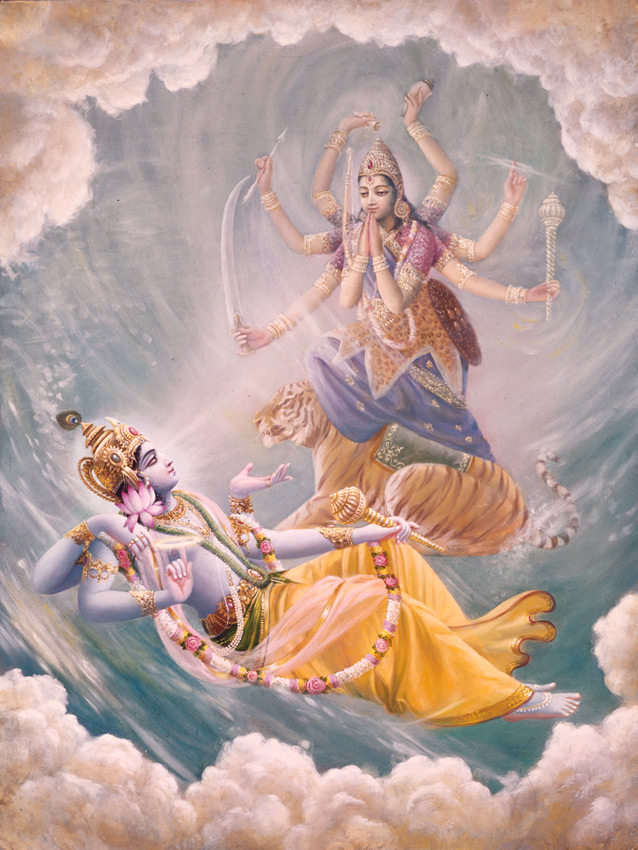 been offered to Rādhā and Kṛṣṇa. He says that the foodstuffs offered to the demigods are not truly prasādam. What is the nature of the foodstuffs we get when we go to the temples of the demigods? What do we call that? Can we eat it?
been offered to Rādhā and Kṛṣṇa. He says that the foodstuffs offered to the demigods are not truly prasādam. What is the nature of the foodstuffs we get when we go to the temples of the demigods? What do we call that? Can we eat it?
Śrīla Bhaktivedānta Nārāyaṇa Mahārāja: We do not eat the remnants of Kālī, Durgā, Śaṅkara (Lord Śiva), or their manifestations. If bhoga (unoffered foodstuffs) is first offered to Kṛṣṇa or Viṣṇu, and Their prasādam is then offered to the demigods, we can accept that. For example, in Bhuvaneśvara, the bhoga is first offered to Ananta Vāsudeva (a form of Kṛṣṇa), and His prasādam is offered to Bhuvaneśvara Liṅga-rāja (Lord Śiva). We can accept that prasādam. We offer obeisances to Śaṅkara, and if a devotee gives the prasādam remnants of Kṛṣṇa to Śaṅkara, we will accept that; otherwise not.*** In any case, we will not accept ashes in imitation of Śaṅkara,**** or other customs accepted by his followers. If someone does not wear tilaka and kaṇṭhī-mālā (tulasī neck beads), then the messengers of Yamarāja, the god of death, will consider, “This person is not a devotee of Kṛṣṇa.” They will take that person to Yamarāja for punishment. So, try 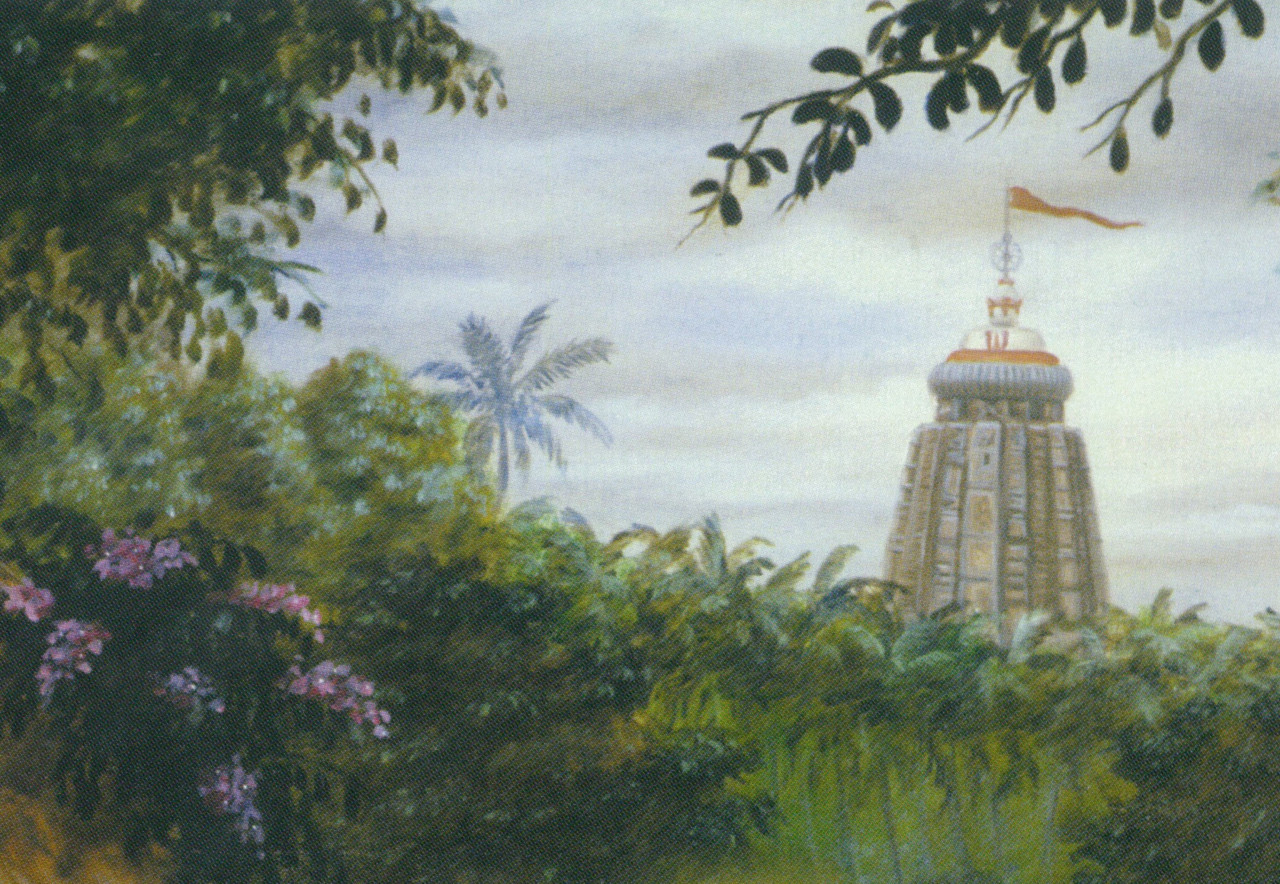 to wear tilaka and kaṇṭhī-mālā.
to wear tilaka and kaṇṭhī-mālā.
*** “Lord Viṣṇu should be offered everything, and His prasāda should be distributed to all the demigods. This practice is still followed in the temple of Jagannātha at Purī. There are many temples of demigods around the main temple of Jagannātha, and the prasāda which is offered first to Jagannātha is distributed to all the demigods. The deity of Bhagālin is worshipped with the prasāda of Viṣṇu, and also, in the famous Lord Śiva temple of Bhuvaneśvara, the prasāda of Lord Viṣṇu or Lord Jagannātha is offered to the deity of Lord Śiva” (Śrīla Bhaktivedānta Svāmī Mahārāja. Śrīmad-Bhāgavatam 4.7.55, purport).
**** Śaṅkara smears his body with ashes in order to show the world the destination of bodies – at death their bodies are burned and turn to ashes.
Image/Art made possible by Pixabay.com, Krishnapath.org and/or Bhaktiart.net
Unless indicated differently, all verse translations and quotes are from the books by Śrīla Bhaktivedānta Svāmī Mahārāja Prabhupāda (Vedabase.com)
